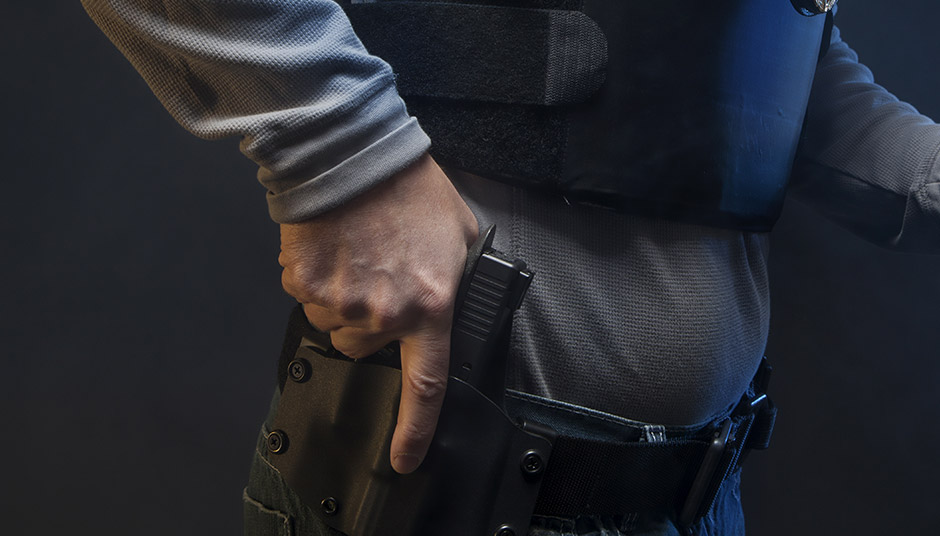At any museum, bank, or government building, there are security professionals nearby keeping the premises secure and observing visitors. Some of these security professionals are armed, and some are not. There are vast differences between what armed vs. unarmed security guards can and cannot do outside of a weapons certificate. Along with restrictions, security professionals must also attain specific levels of training and certifications to work either as an armed or unarmed security guard.
If you’re considering a rewarding career as a security professional, the National Investigative Training Academy, Inc. (NITA) offers unique, online security courses created by former Army Sniper, SWAT, and SOCOM personnel.
Below, consider the requirements and criteria that demonstrate the distinctions between an armed vs. unarmed security guard and which profession most interests you.
What Is an Armed Security Guard?
An armed security professional is hired to help protect a person, a group of people, or a designated area safe from criminal activities, hostilities, or any threat to their safety. While guarding a specified person or location, armed security professionals may also perform general security tasks like maintaining public order.
Armed security professionals typically work for private businesses, security firms, armored car companies, or security firms. To carry a firearm, armed security professionals go through considerable training that includes fundamental firearm knowledge, practices for when to use a firearm appropriately, and a firearm permit.
This is a promising field for retired police officers and military personnel. Often, individuals who fall into one of these categories may waive much of the training requirements due to prior knowledge and experience.
Requirements
There are several requirements that a new security professional will have to meet.
The minimum requirements for armed security professionals include that each individual:
- Must be over the age of 21
- Must possess a high school diploma or GED
- Must have a clean criminal record
Some employers may require armed security professionals to have a college degree in police science or criminal justice, depending on the company.
Training
Security professionals undergo a broad range of training to carry and maintain authorization to carry a firearm. The essential skills taught in armed security guard training programs include:
- Responding appropriately to crisis situations
- Gun laws and firearm training
- Use of non-lethal weapons
- Field notes and report writing
- Operation of security equipment
- Crime prevention
- Crowd control
Some training courses may entail simulations that imitate various emergency scenarios, like a breach in security, vandalism, or an uncontrolled crowd. NITA provides online training courses for many of these programs that can be completed at home at your own pace.
Certifications
After completing the required security guard training, most states require armed security professionals to apply for and receive certification and licensure. To gain this certification, security professionals must:
- Pass a criminal background check
- Pass a drug test
- Complete additional courses (depending on the state)
Security professionals should also have first aid and CPR/AED training. In an emergency, they may be the only ones with this training to help until emergency personnel arrives.
Permit to Carry a Firearm
Security professionals must also have a valid permit to carry a firearm along with the certification and license. Depending on the individual and the position, security professionals can attain either a concealed or unconcealed firearm permit.
Each state’s laws and regulations on firearm permits vary. Some require security professionals to be certified and trained to carry a baton, stun gun, or chemical spray before a final certification to carry a firearm.
Learn more: What Firearms Can a Security Guard Carry?
What Is an Unarmed Security Guard?
An unarmed security guard’s central role is to monitor and protect the property or people they are assigned to safeguard against criminal activity and damage. This often involves surveilling, patrolling, and watching security monitors to keep the premises safe and secure.
Unarmed security professionals are often hired by security firms who outsource their security guards to different jobs. Unarmed security professionals are usually the last defense line to prevent a crisis from intensifying and needing to call law enforcement.
Requirements
An unarmed security professional must meet similar minimum requirements to an armed security professional. They:
- Must be over the age of 18
- Must possess a high school diploma or GED
- Must pass a criminal background check
In most states, unarmed security professionals must acquire certification for completing unarmed security guard training. NITA provides online Unarmed Security Guard Training that meets the State of Georgia’s requirements and can be completed from home.
Training
Security professionals must enroll and complete training to be an unarmed security guard, which includes:
- Fundamentals of personal security
- Responding appropriately to crisis situations
- Public relations
- Field notes and report writing
- Law enforcement
You’ll also learn about a security professional’s powers to arrest during training. While an unarmed security professional may not place anyone under arrest, they may detain someone who endangers themselves or the people nearby while waiting for law enforcement to arrive. Security professionals learn in their training how to safely restrain and detain a suspected criminal.
Certifications
After completing unarmed security guard training, individuals receive a certification of completion that meets the state’s requirement to obtain a security guard license.
Become a Trained Security Professional with NITA’s Online Courses
A career as a security professional is fast-paced and exciting, with unlimited options for advancement. With a healthy salary and job outlook, there are plenty of reasons to begin or advance your professional security experience.
National Investigative Training Academy, Inc. (NITA) offers various pre-licensing, continuing education, and professional development online security training courses that are state-approved and designed for 100% student satisfaction.
Our enrollment counselors are here to answer any questions you might have about our state- and board-approved status, pre-licensing training, or professional development programs.




